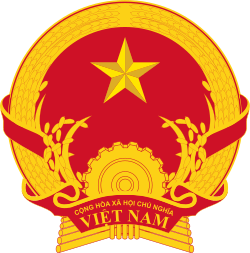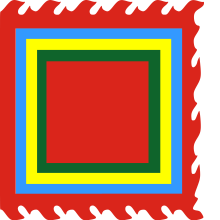Human rights in Vietnam
Human rights in Vietnam (Vietnamese: Nhân quyền tại Việt Nam) have long been a matter of much controversy between the Government of Vietnam and some international human rights organizations and Western governments, particularly that of the United States. Under the current constitution, the Communist Party of Vietnam is the only one allowed to rule, the operation of all other political parties being outlawed. Other human rights issues concern freedom of association, freedom of speech, and freedom of the press.
 |
|---|
| This article is part of a series on the politics and government of Vietnam |
|
Ideology |
|
|
|
Legislative
|
|
Presidency
|
|
Executive
|
|
|
Military
|
|
|
See also
|
|
|
_Democracy%2C_Human_Rights_Rally_63.jpg)
_infobooth_and_recruitment_centre.jpg)
Since 1994, Vietnam Human Rights Day is celebrated each year on 11 May.[1]
Vietnam's report about human rights in UN human rights council
A report drafted by the Vietnamese government on 18 June 2007 for the United Nations Human Rights Council to review the implementation of human rights in the territory of Viet Nam stated: For Viet Nam, the people are both the ultimate objective and driving force of any social and economic development policy, and protecting and promoting human rights are always the Government's consistent policy. The 1992 Constitution, the supreme law of the country, guarantees that all citizens enjoy equal political, economic, cultural and social rights, and are equal before the law. Every citizen has the right to participate in the management of the State and the society, the freedoms of religion and belief, the right to free movement and residence in the territory of Viet Nam, the right to complaints and petitions, the right to employment, education and healthcare etc. regardless of gender, race and religion. On that basis, Vietnamese laws enumerate the specific rights in accordance with international human rights standards.[2]
The report argued that freedoms of expression, press and information of the Vietnamese people were clearly illustrated through the rapid and diverse development of the mass media. As of 2008, there were over 700 press agencies with 850 publications, nearly 15,000 licensed journalists, 68 radio and television stations at central and provincial levels and land-based digital TV stations, 80 e-newspapers, thousands of news websites and 55 publishers. The people of Viet Nam were provided with greater access to advanced information technology, especially the internet, with about 20 million internet users, accounting for 23.5% of the population, higher than Asia's average rate of 18%. Apart from the domestic media, the people of Viet Nam had access to dozens of foreign press agencies and television channels, including Reuters, BBC, VOA, AP, AFP, CNN and many other major international papers and magazines.[2] The growing economy had enabled the Government to concentrate resources on such priorities as education, health, infrastructure development, human resource development, poverty reduction and assistance to underdeveloped areas.[2] The government had promulgated and amended around 13,000 laws and by-law documents, in which civil and political rights are elaborated. The 1992 Constitution recognized fully all human rights (Articles 2 and 50).[2]
The report highlighted the rapid growth, diverse forms of mass media, belief in the lively and diverse society in Vietnam, as well as securing the rights of women, children and the disabled. It argued that thanks to the protection and promotion of human rights, Vietnam's economy, society, and culture have made great strides.[2] But the report also acknowledged that there are still inadequacies in the country, difficulties to be solved, in which the legal system lacks uniformity and spot overlapping conflicts, not keep up with reality, leading to difficulties, misunderstandings and even affect the constitutional guarantee, the feasibility and transparency in the process of ensuring human rights.[2]
According to the Vietnamese embassy, the UN ratified Vietnam's human rights report.[3] The embassy also stated that many of these countries appreciated Vietnam's renewal, achievements and strong commitment to fostering human rights.[4] Also, there were some opinions against the adoption but these were rejected.
According to a 1997 report by the China Internet Information Center, Vietnam has made a number of changes to its constitution, laws, and practical policies in the area of human rights since the Doi Moi, or the economic reform in 1986. For instance, the Constitution was amended in 1991 to enshrine the protection of "political, civil, economic, cultural and cultural rights" for the first time, and the penal code explicitly banned torture. Internationally, Vietnam was the second signatory of the Convention on the Rights of the Child. Although Vietnam retains capital punishment, the Constitution of 1992 reduced the number of eligible crimes from 44 to 29, and over 90% of the population has access to health care. In women's rights, Vietnam ranks 2nd among Asia-Pacific countries and 9th among 135 countries in percentage of Female Parliamentarians.[5]
Recent reports regarding human rights in Vietnam
In its 2004 report on Human Rights Practices, the U.S. State Department characterized Vietnam's human rights record as "poor" and cited the continuation of "serious abuses." According to the report, the government has imposed restrictions on freedom of speech, freedom of the press, freedom of assembly, and freedom of association.
Recent US reports maintain the same observations and international human rights organizations that share these views include Human Rights Watch[6] and the Unrepresented Nations and Peoples Organization.[7] The United Nations[8] has highlighted religious persecution.
In 2009, the European Parliament expressed concern about "the growing climate of intolerance in Vietnam towards human rights defenders and members of officially unrecognized religious communities." It called on the government to end repression against freedom of expression, belief, and assembly, and to release its "political prisoners".[9]
The government officially provides for freedom of religion and recognizes Buddhist, Roman Catholic, Protestant, Hòa Hảo, Cao Đài, and Muslim denominations. However, the government supervises the clergies of the sanctioned groups (by approving appointments, for example) in the interest of "national unity".[10]
Freedom of expression remains a problem as the Vietnamese authorities continue to use tough national security laws to punish critics of the regime. The official media remained tightly controlled by government censorship and obstruction.[11]
Restrictions on the freedom to assemble remain a problem in Vietnam. There is an effort of the government to delay issuing a law for legalizing demonstration/strike although demonstration is legal as written in Vietnam's Constitution.
As of 2017, Vietnam held over 100 political prisoners for the crime of criticizing the government or participating in religions, protests, activism, or political parties not sanctioned by the government.[12][13]
According to Human Rights Watch, government of Vietnam is increasing its crackdown on dissidents, human rights activist and independent journalists, ahead of the 13th party congress of the Communist Party of Vietnam that will take place in January 2021. The court has also increased the prison time for dissidents serving detention.[14]
Current human-rights related dissidents
In 2009, Le Cong Dinh, a lawyer who several years previously had acted for the government in a successful case against American catfish farmers, was arrested and charged with the capital crime of subversion; several of his associates were also arrested.[15][16] Many Western governments condemned the move, and human rights groups alleged that the arrest was due to Le Cong Dinhs' support for freedom of speech.[16] Amnesty International named him and his arrested associates prisoners of conscience.[16]
Vietnam currently holds several other individuals in detention whom Amnesty International considers to be prisoners of conscience: Cù Huy Hà Vũ, convicted of "conducting propaganda against the state" for giving interviews to foreign press;[17] Nguyen Dan Que, convicted of "red-handed keeping and distributing documents" calling for the overthrow of the government;[18] and Roman Catholic priest Nguyen Van Ly (also known as Father Thaddeus) detained for "spreading propaganda against the state."[19] Amnesty International has called for the immediate and unconditional release of all three men.
In January 2019, the authorities of Vietnam arrested and sentenced an Australian democracy activist, Chau Van Kham, to 12 months of imprisonment on charges of “financing terrorism”. The 70-year-old was arrested over his membership of pro-democracy group Viet Tan. The charges against him were claimed to be baseless and politically motivated by human rights advocates, lawyers and his family. In June 2020, The Guardian reported that the activist “disappeared” inside the Vietnam’s prison system for nearly four months, as his family and the Australian government have no contact or information about him.[20]
Ethnic minorities
The Cham, Montagnard and Khmer Krom minorities joined together in the United Front for the Liberation of Oppressed Races (FULRO), to wage war against the Vietnamese for independence during the Vietnam War. The last remaining FULRO insurgents surrendered to the United Nations in 1992.
Various ethnic minority organizations like the Montagnard Foundation, Inc., International Office of Champa, and Khmers Kampuchea-Krom Federation allege that the Vietnamese people and government perpetuate human rights abuses against the Degar (Montagnards), Cham, and Khmer Krom. Vietnam has settled over a million ethnic Vietnamese on Montagnard lands in the Central Highlands. The Montagnard staged a massive protest against the Vietnamese in 2001, which led the Vietnamese to forcefully crush the uprising and seal the entire area off to foreigners.
The Cham in Vietnam are only recognized as a minority, and not as an indigenous people by the Vietnamese government despite being indigenous to the region. Both Hindu and Muslim Chams have experienced religious and ethnic persecution and restrictions on their faith under the current Vietnamese government, with the Vietnamese state confiscating Cham property and forbidding Cham from observing their religious beliefs. Hindu temples were turned into tourist sites against the wishes of the Cham Hindus. In 2010 and 2013, several incidents occurred in the villages of Thành Tín and Phươc Nhơn, where Cham were murdered by Vietnamese. Cham Muslims in the Mekong Delta have also been economically marginalized and pushed into poverty by Vietnamese government policies, with ethnic Vietnamese Kinh settling on majority Cham lands with state support, and the religious practices of minorities have been targeted for elimination by the Vietnamese government.[21]
The Vietnamese government fears that evidence of Champa's influence over the disputed area in the South China Sea would bring attention to human rights violations and killings of ethnic minorities in Vietnam such as those which were committed in the 2001 and 2004 uprisings, and lead to the issue of Cham autonomy being brought into the dispute, since the Vietnamese conquered the Hindu and Muslim Cham people in a war in 1832, and the Vietnamese continue to destroy evidence of Cham culture and artifacts left behind, plundering or building on top of Cham temples, building farms over them, banning Cham religious practices, and omitting references to the destroyed Cham capital of Song Luy in the 1832 invasion in history books and tourist guides. The situation of the Cham compared to that of ethnic Vietnamese is substandard, with the Cham lacking water and electricity and living in houses made out of mud.[22]
References
- Pressure Mounting on Vietnam to Improve Human Rights, Epoch Times, 20 May 2013
- "National report of Vietnam under the universal periodic review of UN human rights council".
- "UN ratify Vietnam's human rights report". Archived from the original on 9 October 2011.
- "Vietnam adheres to human rights, says diplomat".
- "Human Rights in Vietnam During Renovation Process: Achievements, Challenges and Prospects". China Internet Information Center. 19 August 1997. Retrieved 28 August 2010.
- "Vietnam's Human Rights Defenders". Human Rights Watch. 23 March 2010.
- "UPR: Vietnam's Human Rights Violations Exposed by". UNPO. 25 March 2009. Retrieved 20 December 2010.
- http://lib.ohchr.org/HRBodies/UPR/Documents/Session5/VN/A_HRC_WG6_5_VNM_3_E.pdf
- "Motion for a resolution on human rights in Vietnam and Laos – B7-0157/2009". Europarl.europa.eu. Retrieved 20 December 2010.
- "Reports – Christian Solidarity Worldwide". Dynamic.csw.org.uk. Retrieved 20 December 2010.
- "Archived copy". Archived from the original on 23 July 2013. Retrieved 1 September 2013.CS1 maint: archived copy as title (link)
- Rushford, Greg (23 July 2013). "Mr. Sang Comes to Washington". Rushford Report. Archived from the original on 28 September 2013. Retrieved 1 September 2013.
- "Vietnam: Release All Political Prisoners". hrw.org. Human Rights Watch. 3 November 2017. Retrieved 21 April 2019.
- "Vietnam: Crackdown on Peaceful Dissent Intensifies". Human Rights Watch. Retrieved 19 June 2020.
- Mydans, Seth (24 December 2009). "Vietnam Charges Lawyer With Capital Crime". The New York Times. Retrieved 4 May 2010.
- "Vietnam lawyer subversion charge". BBC News. 24 December 2009. Retrieved 4 May 2010.
- "Prominent Vietnamese activist jailed over democracy calls". Amnesty International. 5 April 2011. Archived from the original on 29 April 2011. Retrieved 17 April 2011.CS1 maint: BOT: original-url status unknown (link)
- "VIETNAMESE AUTHORITIES MUST RELEASE DR. NGUYEN DAN QUE". Amnesty International. 28 February 2011. Archived from the original on 29 April 2011. Retrieved 17 April 2011.
- "VIET NAM: FURTHER INFORMATION: CATHOLIC PRIEST RISKS BEING RETURNED TO PRISON: FATHER NGUYEN VAN LY". Amnesty International. 9 February 2011. Retrieved 17 April 2011.
- "Jailed Australian democracy activist has 'disappeared' inside Vietnam's prison system". The Guardian. Retrieved 6 June 2020.
- Taylor, Philip (December 2006). "Economy in Motion: Cham Muslim Traders in the Mekong Delta" (PDF). The Asia Pacific Journal of Anthropology. The Australian National University. 7 (3): 238. doi:10.1080/14442210600965174. ISSN 1444-2213. Archived from the original (PDF) on 23 September 2015. Retrieved 3 September 2014.
- Bray, Adam (16 June 2014). "The Cham: Descendants of Ancient Rulers of South China Sea Watch Maritime Dispute From Sidelines". National Geographic News. National Geographic. Archived from the original on 10 May 2019. Retrieved 3 September 2014. Alt URL
- "Rafto Laureates". Archived from the original on 20 August 2006. Retrieved 9 December 2006.

External links
- Vietnamese Human Rights Newspaper
- US Department of State Human Rights Report 2009 Vietnam
- Censorship in Vietnam – IFEX
- Human rights in Vietnam on websites of international NGOs: Human Rights Watch and FIDH
- Vietnam Human Rights Journal (blogspot)
- www.rafto.no
- Vietnam Human Rights Network
- report
- Vietnam: from "Vision" to Facts. Human Rights in Vietnam under its Chairmanship in ASEAN FIDH, 2010
- UNPO – Vietnam Human Rights Report 2009
- National report of Vietnam under the universal periodic review of UN human rights council
- Indigenous People Face Deliberate Persecution in Vietnam
- Highlighting Vietnamese Government Human Rights Violations In Advance of the U.S.-Vietnam Dialogue: Hearing before the Subcommittee on Africa, Global Health, Global Human Rights, and International Organizations of the Committee on Foreign Affairs, House of Representatives, One Hundred Thirteenth Congress, First Session, 11 April 2013
- Continuing Repression by the Vietnamese Government: Hearing before the Subcommittee on Africa, Global Health, Global Human Rights, and International Organizations of the Committee on Foreign Affairs, House of Representatives, One Hundred Thirteenth Congress, First Session, 4 June 2013

